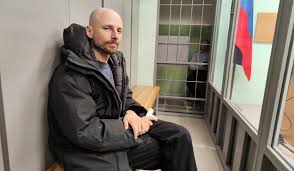Two Russian journalists, Konstantin Gabov and Sergey Karelin, found themselves ensnared in the grip of their government’s “extremism” charges, as courts in Russia ordered their detention on Saturday pending further investigation and trial. Both journalists vehemently denied the allegations leveled against them, which accuse them of collaborating with a group founded by the late Russian opposition figure, Alexei Navalny.
Facing the specter of a minimum two-year prison sentence and a maximum of six years for their alleged involvement in an “extremist organization,” Gabov and Karelin are the latest casualties in a broader crackdown by Russian authorities on dissent and independent media. This crackdown has escalated following Russia’s full-scale invasion of Ukraine over two years ago. In a bid to control the narrative surrounding the conflict, the Russian government has enacted laws criminalizing the dissemination of what it deems to be false information about the military, effectively silencing any critique of its actions in Ukraine.
The pair is accused of producing content for a YouTube channel associated with Navalny’s Foundation for Fighting Corruption, an organization that has since been outlawed by the Russian government. Their apprehensions mark a troubling trend in Russia’s treatment of journalists, with Gabov, a freelance producer with a portfolio spanning multiple organizations including Reuters, being detained in Moscow, and Karelin, who holds dual Israeli citizenship, being apprehended in Russia’s northern Murmansk region. Karelin, 41, has contributed to various media outlets, including The Associated Press, and previously worked as a cameraman for Deutsche Welle until the outlet was banned by the Kremlin in February 2022.
The detention of Gabov and Karelin underscores the broader crackdown on dissenting voices in Russia, which targets not only journalists but also opposition figures, activists, members of the LGBTQ+ community, and ordinary citizens critical of the Kremlin. Antonina Favorskaya, for instance, remains in pre-trial detention after being accused of participating in an “extremist organization” due to her social media posts affiliated with Navalny’s Foundation. Similarly, Evan Gershkovich, an American reporter for The Wall Street Journal, languishes in Moscow’s notorious Lefortovo Prison on espionage charges, a claim vehemently denied by both Gershkovich and his employer.
The unfolding events serve as a stark reminder of the perils faced by journalists and dissenters in Russia, where the government’s grip on power is tightening, and freedom of expression is increasingly under threat.


















